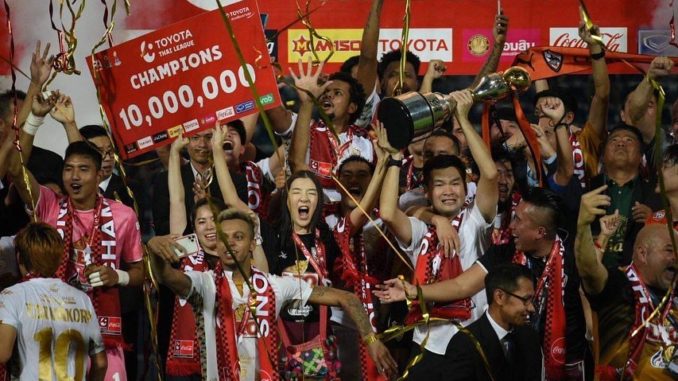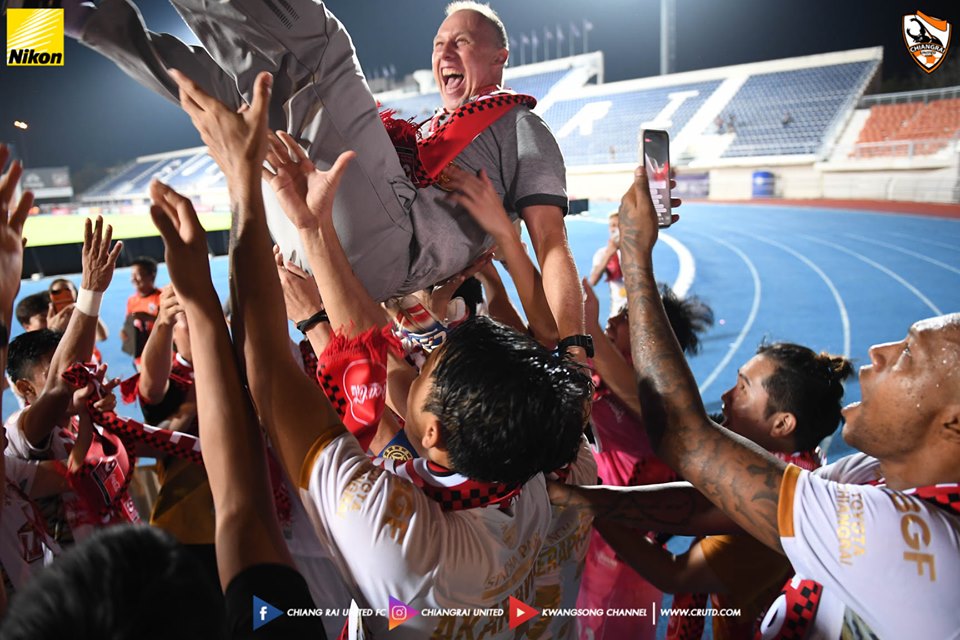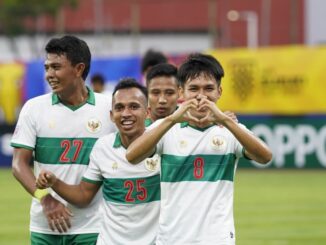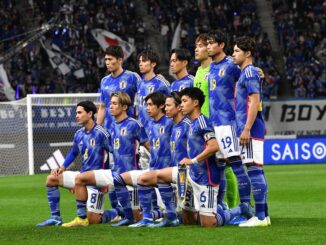
One of the most dramatic final days in Thai League history took place on Sunday, and Gian Chansrichawla explains how Chiang Rai United finally broke the duopoly of Buriram United and Muangthong United to win their first ever title.
Last Saturday will go down as one of the most significant days in Thai League history, as outsiders Chiang Rai United broke an over decade-long duopoly at the upper echelons of the nation’s football pyramid by beating Buriram United to seal their first ever league title.
Chiang Rai pushed the defending champions right down to the wire, and were there to pounce when Buriram failed to beat Chiang Mai FC on the final day, securing the league title by the smallest possible margins. Their remarkable victory remains an enigma, but I hope to break it down and explain five factors that helped the Northerners become the 2019 Thai League champions.
Blending Youth and Experience
Chiang Rai’s squad had a unique blend of youthful hunger and desire, with experience of seeing out tough games through to the end. Having won two FA Cups and the League Cup under the guidance of Alexandre Gama in 2017 and 2018, the side had become accustomed to the high stakes and knew how it felt to go all the way, giving them a psychological edge which should not be underestimated.
Additionally, most of the side’s foreign players were already at the club last season, saving a potentially costly adaptation period. Bill Rosimar, William Henrique and Lee Yong-Rae have all tasted success with the Beetles already, and were ready to get going from the off.
Only center-back Brinner Henrique was an exception, but he settled in quickly under the guidance of countryman Ailton Silva and was arguably one of their best players this season.
On the other hand, the local core of the squad were still in their late teens or early 20s, eager to make history with the club where they made their names at what could be a critical juncture in their respective careers.
Phitiwat Sukjitthamakul, Siwakorn Tiatrakul, Shinnaphat Lee-Oh and Ekanit Panya have all ‘grown up’ at the club, and looked like an incredibly cohesive group this season. All four were awarded call-ups to the senior national team this season, showing how their success has not gone unnoticed.
Consistency
Being the best team over an eight month season is no easy feat, and consistency can sometimes be an undervalued trait. To demonstrate this, Chiang Rai were the only side who managed to win as many points away as they did at home (29), and were incredibly solid defensively throughout their travels.
In addition, the side fared well in most of the big games, with their compactness and discipline allowing them to spring surprises. Instead of being burdened with keeping possession, they are incredible at stifling their opponents with a well-rehearsed repertoire of both defensive and pressing moves, topped off with lethal counter-attacks.
It is this approach that allowed them to pull off victories such as a 4-1 victory away against Port FC and, most impressively, the 4-0 win at home against Buriram United, which ultimately was the margin that separated the two sides and sealed the title for Chiang Rai.
Flexibility
While far from being the most glamorous side to watch, Chiang Rai are an incredibly functional side that is capable of shifting systems with ease to counter the threats posed by the opposition.
The Beetles deployed a number of different systems and combinations throughout the season, using the full depth of the squad.
Almost all of their key players are multi-functional: Siwakorn Tiatrakul has shifted from a right-winger to a central midfield playmaker, Ekanit Panya is capable on either flank or down the middle, Suriya Singmui and Chaiyawat Buran allow the side to play a multitude of combinations down the left, and Lee Yong-Rae can virtually play anywhere on the pitch.
Add to this the tireless running of Phitiwat Sukjitthamakul, capable of providing cover to any system they field, and it’s easy to see why they are so lethal.
Buriram off the pace
With all due respect for their achievements, Chiang Rai were not exactly a remarkable team this season.
In fact, they are the only league champion in the last decade to finish the season with an average of less than two points per game (recording a 1.93 average by collecting 58 points from 30 games).
You have to go back as far as 2006 to find a team with a lower points-per-game average, when Bangkok University only managed 39 points in the 22-game season.
In light of this, it’s probably fair to say that Chiang Rai’s win is in large part due to an under-performance from the other top teams, particularly Buriram United.
The Thunder Castle have been poor this season, relying heavily on young local players to take up the mantle in key positions as their foreign stars failed to reach the level expected of them. The side struggled to progress play from midfield to attack and were easily found out by disciplined defenses which they would’ve been able to break down in previous years.
In addition to their failure, Muangthong’s poor start to the season excluded them from the title race, and both Port and Bangkok United registered worse results than they did last season, paving the way for the most consistent side to run away with the title.
Ailton Silva
Arguably the most important factor behind their success, it goes without saying that coach Ailton Silva is responsible for most of the side’s aforementioned strengths. Taking his first job outside of his homeland, people didn’t have high expectations of the softly spoken coach.
However, the signs were clear right from the off that he could achieve something impressive with the Beetles. He took over just a couple of weeks before the start of the season, replacing Jose Alves Borges, whose sudden resignation caught the club by surprise and possibly indicated that all was not right behind the scenes at the club.

However, just eight days after taking charge, Ailton managed an impressive draw away against Japanese side Sanfrecce Hiroshima – a first look at the incredible defensive stability for which he would become renowned – only to lose on penalties.
Aided by a fluent Thai-Portuguese translator, he showed a remarkable man-management ability, bridging the cultural divide that proves problematic for so many managers with an incredible and almost unbelievable ease, which speaks to true leadership and his unique ability to connect with players.
His ability not only to anticipate his opponents and prepare counter-measures, but to communicate that so clearly and effectively was crucial for Chiang Rai to become as functional and tough to beat as they were throughout the season.
Without his guidance, and the strengths which he has demonstrated repeatedly this season, it is hard to imagine Chiang Rai lifting the golden trophy.
Photo: Thai League & Chiang Rai United
Listen to Paul and Gian review the Thai League on Episode 44 of The Asian Game podcast




